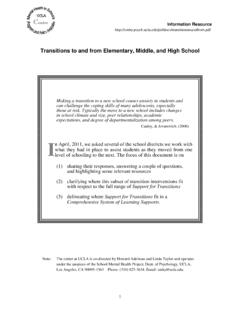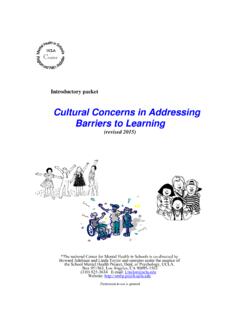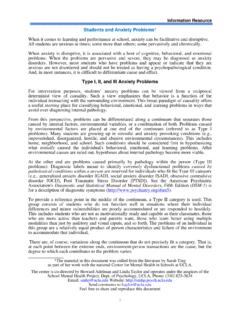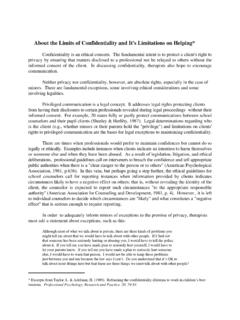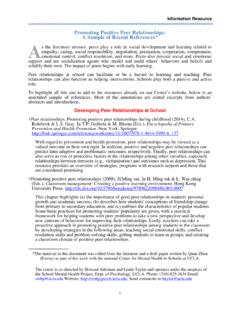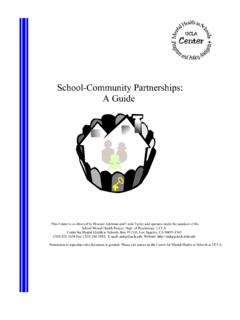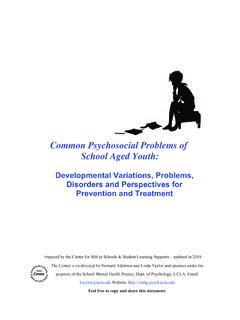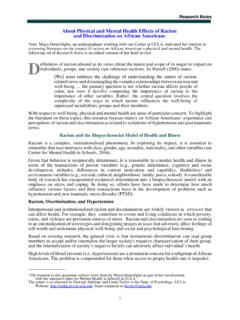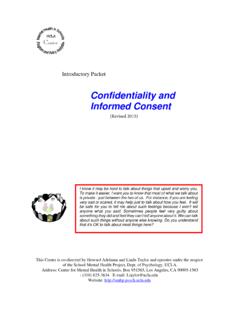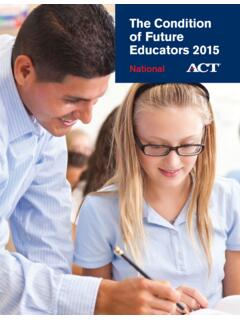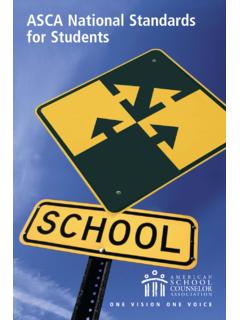Transcription of Authoritarian vs. Authoritative Parenting
1 Information Resource Authoritarian vs. Authoritative Parenting Many of us end up Parenting based on what we believe our parents did right and wrong. [Note from Center Co-directors:* Our Center is fortunate to be able to benefit from the energy and talents of many UCLA students . Because of her interest in the impact on children of Authoritarian Parenting , Chaoyi He, an undergraduate, researched the topic of Parenting styles and we developed the following to be shared as part of the Center's resources.]. ssuming that a parent's goal is to help offspring develop into healthy and well-functioning A adults, the question of best Parenting practices arises. Scholars have approached this in the context of Parenting styles. The popular media have adopted terms such as helicopter parents, free range parents, tiger moms, uninvolved parents, abuse parents, and more.
2 Based on early work by Baumrind and also by Maccoby and Martin, four major Parenting styles have been categorized -- neglectful, Authoritarian , permissive, and Authoritative . Each style is distinguished along two continua -- demandingness and responsiveness. Responsiveness stresses the degree of regard given to a child's wants and needs ( , at one end, being extremely responsive to wants and needs and on the other end being completely unresponsive). Demandingness stresses the degree to which boundaries are set and demands are made ( , ranging from setting firm boundaries and making firm demands to setting no boundaries and making requests that are quickly withdrawn at the first sign of resistance). Overlapping these is the type of overprotective Parenting suggested by the term helicopter Parenting . In addition to the above, research has studied proactive and reactive Parenting .
3 Our focus here is on contrasting Authoritarian and Authoritative Parenting and some implications for involving parents at a school. About Authoritarian Parenting Authoritarian parents are characterized as being extremely strict -- demanding unquestioning obedience and exerting excessive control over their child (Baumrind 1991). They are perceived as lacking warmth and responsiveness. Their methods of control include but are not limited to threats, coercion, guilt induction, love withdrawal, and punishment (Barber, 2002). Authoritarian Parenting is associated with many externalizing and internalizing problems in both girls and boys (Akhtar, Malik, & Begeer, 2016; Braza et al., 2015; Calzada, Barajas-Gonzalez, Huang & Brotman, 2017; Cheung, 2014; Clark, Dahlen, & Nicholson, 2015; Hartman et al., 2014;. Kerpelman, Mcelwain, Pittman, & Adler-Baeder, 2013; King, Vidourek, & Merianos, 2016; Moed, Gershoff, & Bringewatt, 2016; Palmer, 2014; Pellerone, Tolini, & Polopoli, 2016; Tavassolie, Dudding, Madigan, Thorvardarson, & Winsler, 2016; Wood & Kennison, 2017; Yaffe, 2017).
4 For example: Children who experience perfectionistic pressures from parents are more prone to high levels of perfectionism, rigidity, critical attitudes, and anxiety (Randall, Bohner, & Travers, 2015). They also report higher levels of internalizing problems and lower levels of life satisfaction. Harsh Parenting , which usually entails spanking, slapping, yelling and shouting at the children, is negatively associated with academic achievement and less engagement in classroom activities (Wang, Deng, & Du, 2017). _____. *The material in this document reflects work done by Chaoyi He as part of her involvement with the national Center for MH in Schools and Student/Learning Supports at UCLA. The center is co-directed by Howard Adelman and Linda Taylor in the Dept. of Psychology, UCLA. Website: Send comments to 1. Commonly cited problems are trends for the children to conform easily and have strong relational dependence associate obedience and success with love struggle with self-control and making choices have a strong sense of failure and low self-esteem have difficulty in social situations ( , lack social competence, display inappropriate aggressive and risky behavior when not at home, be fearful or overly shy).
5 Suffer from depression and anxiety Notes: Although Authoritarian Parenting is associated with many negative outcomes, it is not equivalent to abuse. In pursuing specific practices, it is likely that most parents think they are operating in the best interests of their children and are uninformed about potential negative consequences. Chaoyi He notes the use of Authoritarian Parenting in Asian cultures where there is a belief among many that tough love leads to success. She quotes You and Malley-Morrison (2000): Many Chinese proverbs and sayings demonstrate the firm belief in strict, Authoritarian style Parenting . An example is , which literally translates to beating is (a sign of). affection, (and) cursing is (a sign of) love (Xi o Y o Y u N o). Another example is . , which translates to love (your) children in (your) heart, (but) display hatred on (your).
6 Face (Xi o Y o Y u N o). Yet another example: , which translates to a stick produces filial sons, (and) chopsticks [symbolizing indulgence] produce disobedient ones . (B i K G Sh ). These sayings provide a little insight into the traditional Chinese Parenting strategy: strict discipline. The Chinese, among other Asians, embrace Authoritarian Parenting . It is enrooted and normalized in Asian Parenting culture, characterized by parental behaviors such as low emotional warmth, over control, greater rejection, unquestioning obedience and respect for authority, less verbal reasoning and discussion from their children . Authoritative Parents Authoritative parents are characterized as making reasonable demands and being highly responsive. They have high expectations and set basic limits, while listening to and validating their child and ensuring the youngster has appropriate support and guidance to succeed and be independent.
7 They apply discipline fairly and discuss the reasoning behind the discipline and how to change behavior in the future. They recognize children's rights and individual differences. And they continually convey caring, love, and warmth. While Authoritative Parenting generally is viewed as likely to produce the best outcomes, there are potential negatives that need to be understood and countered. On the positive side, research suggests that children raised by Authoritative parents are more likely to become independent, self- reliant, socially accepted, academically successful, be well-behaved with good emotional control and regulation, and have happier dispositions (Carlo, White, Streit, Knight, & Zeiders, 2017;. Karim, Sharafat, & Mahmud, 2013; Kenney, Lac, Hummer, Grimaldi, & Labrie, 2015; Leung, Lo, Tsang, & Chan, 2017; Li, X., & Xie, J.)
8 2017; Majumder, 2015; Mckinney, Morse, & Pastuszak, 2014; Pinquart, 2015; Raboteg-Saric & Sakic, 2013; Smokowski, Bacallao, Cotter, & Evans, 2014;. Yeung et al., 2016). For example: Authoritative Parenting is associated with a higher degree of self- control (Palmer, 2010) and has been shown to be associated with favorable self-concepts and negatively associated with social withdrawal (Cheung 2014). 2. With respect to possible negative aspects, all intensive Parenting takes considerable time and persistence. Authoritative Parenting places additional demands on those in the home. The interpersonal transactions can be extremely complex and must be carefully moderated, family members must be in agreement about practices and be flexible when changes are called for, conflicts do arise, differences among siblings must be considered, and a high degree of patience is called for on the part of everyone in the home.
9 All this can be stressful and disruptive. Some Implications for Involving Parents at School Clearly, as with students , parents differ in many ways. As schools strive to enhance parent involvement, these difference raise significant challenges. To date, school improvement plans have not adequately addressed these challenges. Our analyses indicate that this will continue to be the case as long as the focus fails to account for the variety of individuals providing Parenting and until involvement is designed as a mutually beneficial, equitable, and engaging process. Instead of just focusing on parent involvement think about students being raised primarily by grandparents, aunts, older siblings, nannies, and in foster homes. Primary child caretakers differ. That is why we stress the term home involvement. Other home involvement complications stem from factors such as caretaker economic status, work schedules, immigrant status, ethnic and racial considerations, single parent families, number of youngsters in the home, homes where English is not spoken, extended families, military families, families where parents are in prison, foster homes, and homeless families and youngsters.
10 In addition, some caretakers have disabilities, and some are dysfunctional. Home situations also differ in caretaker attitudes about school. Such attitudes often reflect personal past experiences as well as current encounters and how well their youngsters are doing at school. (Remember, some have more than one youngster who is not doing well.) Involving reluctant primary caretakers is difficult and often handled at school as a low priority. In general, as with students , parents and other caretakers vary in their personal motivation and ability to participate at school. And as with many students who are not doing well at school, (re)establishing productive working relationships with some caretakers involves addressing individual psychosocial and educational barriers and doing so in a personalized way. With all this in mind, the Center's focus on home involvement and engagement conceives a continuum of potential interventions that reflects the differences in primary caretakers' practices, needs, and interests and the needs of the school.
